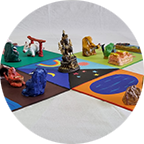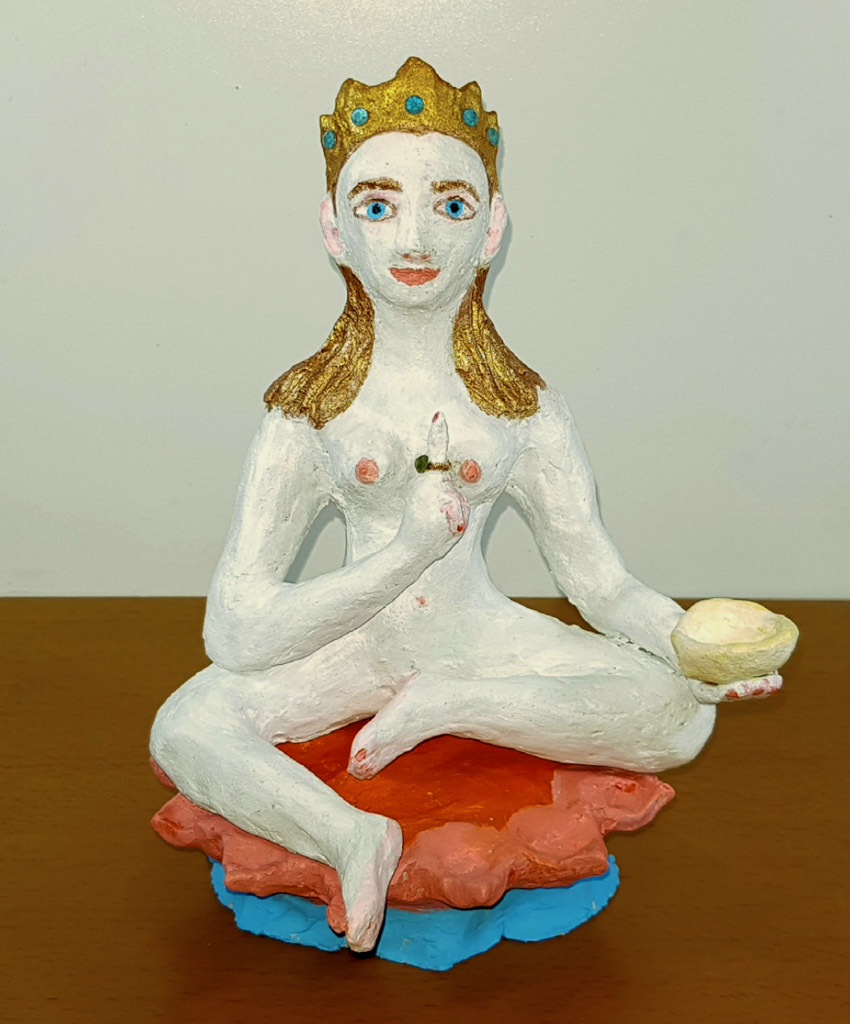Retelling: Vova Pyatsky and Smadar Pyatsky (based on the translations of the suttas published on Theravada.ru and SuttaCentral.net)
Russian Version: Чуладуккхакхандха сутта, Малая беседа о скоплении страданий, Мадджхима Никая 14 | Три Ваджры
Translation to English: Roni Sherman and Marina Sherman
The question of the layman Mahanama
The layman Mahanama, who had long followed the Buddha’s Dhamma, had been diligently purifying his mind from the stains of delusion, anger and craving. However he discovered that, although those unwholesome states had weakened in him, they occasionally filled his mind. Mahanama asked the Buddha about the reason for the resurgence of unwholesome states. Which of the vicious qualities must be discarded for the stains to disappear completely?
The cause of the resurgence of stains
While explaining to Mahanama the cause of the persistent resurgence of the stains of delusion, anger and craving, the Buddha said that Mahanama had not discarded craving for sensual pleasure. The mind is bound by five threads of sensual pleasure (bodily sensations, visible forms, sounds, smells and tastes). People accumulate a lot of suffering for the sake of sensual pleasure: they violate morality by performing unwholesome actions with the mind, speech and body. With the dissolution of the body, such people are reborn in unwholesome places full of deprivation, despair and suffering. While the cause of their various suffering is only in craving for sensual pleasure.
Proper discarding of craving for sensual pleasure
Continuing his explanation, the Buddha explained that craving for sensual pleasure must be discarded properly in order to not give rise to new stains. What discarding is proper and what is improper? Responding to this question, the Buddha told how he met with followers of Niganthi Nataputa (presumably Mahavira, the founder of Jainism) once.
One day, when the Buddha took a stroll after practicing concentration, He saw a band of ascetics indulging in the austerity of prolonged standing, the renunciation of sitting. Meanwhile, due to diligence in this austerity, they experienced excruciating, piercing pains in the body. “Friends, why do you subject your body to excruciating pain? — the Buddha asked. “Friend”, the ascetics replied, “We believe in the teachings of Nigantha Nataputta that, through painful suffering, the consequences of our past sinful deeds can be worn out and eliminated. When we indulge in this severe austerity, we do not give rise to new sinful deeds.”
The Buddha called such discarding of craving for sensual pleasure unskilful, since, in diligent infliction of suffering to one’s own body, the stains of anger, delusion and craving continue to exist. Proper discarding of craving for sensual pleasure is the attainment of pure, sublime states of consciousness — the Immeasurable Feelings and states beyond sensual perception (Tevidzhdzha Sutta, Digha Nikaya 13, and Mahadukkhakhandha Sutta)
The criticism of the ascetics and the Buddha’s response
The ascetics, however, expressed condemnation of the Buddha's lifestyle in which He avoided painful exercise. They said: “craving for pleasure is not eliminated with pleasure. After all, if pleasant states led to knowledge, the king of Magadha would dwell in the greatest wisdom and knowledge.”
The Buddha replied to the ascetics that the pleasure of the sublime states beyond the ordinary senses cannot be compared in its results to ordinary pleasure. The king of Magadha cannot, like a meditator, remain in complete peace of mind and body for a long time. His pleasure is of the ordinary kind, it makes the mind restless. The meditator however, relaxing the mind and body and calming them, realizes the cessation of painful states associated with suffering. Therefore in his mind, anger, delusion and craving, all disappear.
Author
Retelling: Vova Pyatsky and Smadar Pyatsky (based on the translations of the suttas published on Theravada.ru and SuttaCentral.net)
Russian Version: Чуладуккхакхандха сутта, Малая беседа о скоплении страданий, Мадджхима Никая 14 | Три Ваджры
Translation to English: Roni Sherman and Marina Sherman
The question of the layman Mahanama
The layman Mahanama, who had long followed the Buddha’s Dhamma, had been diligently purifying his mind from the stains of delusion, anger and craving. However he discovered that, although those unwholesome states had weakened in him, they occasionally filled his mind. Mahanama asked the Buddha about the reason for the resurgence of unwholesome states. Which of the vicious qualities must be discarded for the stains to disappear completely?
The cause of the resurgence of stains
While explaining to Mahanama the cause of the persistent resurgence of the stains of delusion, anger and craving, the Buddha said that Mahanama had not discarded craving for sensual pleasure. The mind is bound by five threads of sensual pleasure (bodily sensations, visible forms, sounds, smells and tastes). People accumulate a lot of suffering for the sake of sensual pleasure: they violate morality by performing unwholesome actions with the mind, speech and body. With the dissolution of the body, such people are reborn in unwholesome places full of deprivation, despair and suffering. While the cause of their various suffering is only in craving for sensual pleasure.
Proper discarding of craving for sensual pleasure
Continuing his explanation, the Buddha explained that craving for sensual pleasure must be discarded properly in order to not give rise to new stains. What discarding is proper and what is improper? Responding to this question, the Buddha told how he met with followers of Niganthi Nataputa (presumably Mahavira, the founder of Jainism) once.
One day, when the Buddha took a stroll after practicing concentration, He saw a band of ascetics indulging in the austerity of prolonged standing, the renunciation of sitting. Meanwhile, due to diligence in this austerity, they experienced excruciating, piercing pains in the body. “Friends, why do you subject your body to excruciating pain? — the Buddha asked. “Friend”, the ascetics replied, “We believe in the teachings of Nigantha Nataputta that, through painful suffering, the consequences of our past sinful deeds can be worn out and eliminated. When we indulge in this severe austerity, we do not give rise to new sinful deeds.”
The Buddha called such discarding of craving for sensual pleasure unskilful, since, in diligent infliction of suffering to one’s own body, the stains of anger, delusion and craving continue to exist. Proper discarding of craving for sensual pleasure is the attainment of pure, sublime states of consciousness — the Immeasurable Feelings and states beyond sensual perception (Tevidzhdzha Sutta, Digha Nikaya 13, and Mahadukkhakhandha Sutta)
The criticism of the ascetics and the Buddha’s response
The ascetics, however, expressed condemnation of the Buddha's lifestyle in which He avoided painful exercise. They said: “craving for pleasure is not eliminated with pleasure. After all, if pleasant states led to knowledge, the king of Magadha would dwell in the greatest wisdom and knowledge.”
The Buddha replied to the ascetics that the pleasure of the sublime states beyond the ordinary senses cannot be compared in its results to ordinary pleasure. The king of Magadha cannot, like a meditator, remain in complete peace of mind and body for a long time. His pleasure is of the ordinary kind, it makes the mind restless. The meditator however, relaxing the mind and body and calming them, realizes the cessation of painful states associated with suffering. Therefore in his mind, anger, delusion and craving, all disappear.

